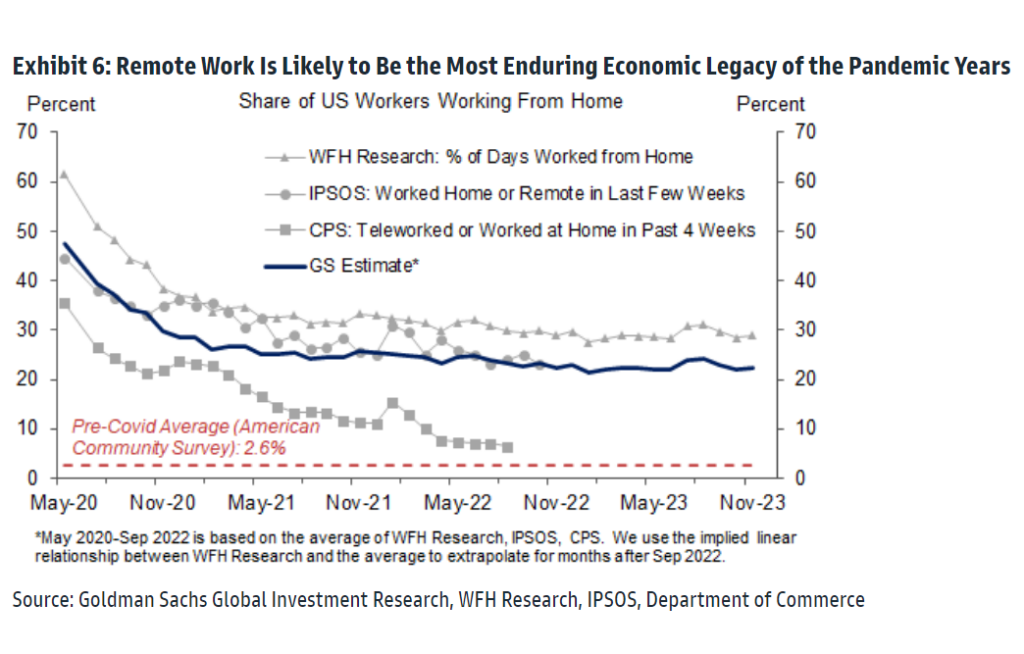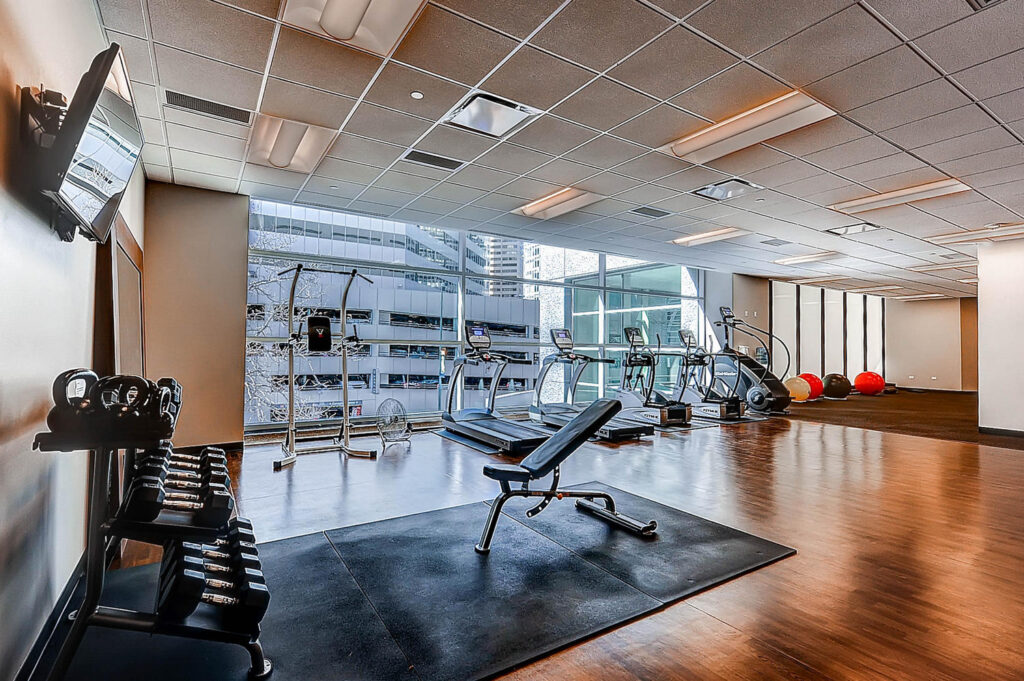As 2024 just begins, what issues keep the world’s executives up at night? CEOs are bracing for a recession and elevated inflation. Facing economic challenges, business leaders prioritize product/service innovation, tech investments, marketing boosts, and market expansion for 2024 growth.
In a recent episode of 60 minutes, they delve into the topic of commercial real estate and explain that as hybrid work hardens from trend to new standard, office occupancy rates have hit all-time lows.
Axios recently reported a new survey of 1,200 executives released by the Conference Board, which revealed that CEOs have thrown up their hands when it comes to getting workers back into the office full-time. The data shows that the future of work is hybrid flexible work. With only 4% of CEOs pushing for full-time office returns, the future of work seems firmly rooted in hybrid and remote models. Over two-thirds of CFOs anticipate their companies to embrace hybrid work in 2024, according to a Deloitte survey.
A Goldman Sachs economist recently wrote in a research note, “Remote work appears likely to be the most persistent economic legacy of the pandemic. The share of US workers working from home at least part of the week has stabilized at around 20-25%, below its peak of 47% at the start of the pandemic but well above the pre-pandemic average of 2-3%.”

In this article, we will dive into how hybrid work impacts the workplace and is transforming commercial real estate.
Here are some key office market statistics that reflect the growing significance of flexible office and coworking spaces in the office market
The commercial real estate sector is in the midst of a significant transformation, primarily driven by the evolving needs of the modern workforce. In particular, the office space segment is significantly shifting from traditional leases towards more flexible and adaptable solutions.
Tobi Skovron, CEO CreativeCubes.Co, an office space operator out of Melbourne, Australia, wrote an open letter to commercial landlords, With the rise of hybrid work, offices & buildings must transform into versatile environments.
- Increased Demand: Flexible office space demand increased by 10% in 2021, compared to pre-pandemic levels, driven by the rise of remote work, cost-effectiveness, and flexible lease terms.
- Market Share: Flexible office space accounted for approximately 3% of the total office market in 2020 but will surge towards 30% over the next decade, representing a substantial increase compared to previous years.
- Corporate Adoption: Around 40% of global corporate occupiers plan to incorporate flexible office space into their real estate portfolios, highlighting the growing acceptance of flexible workspace options that they want to offer to their staff and teams
- Hybrid Workforce: 71% of global corporate real estate executives expect to adopt hybrid work policies, driving the need for flexible office solutions that accommodate employees splitting their time between home and the office.
Flexible Work Arrangements can Offer Many Benefits for Both Tenants and Landlords
For tenants, they can reduce costs, increase productivity, enhance employee satisfaction, and improve talent attraction and retention. Companies can only pay for what they need, whether a single desk, a meeting room, or a private office.
Landlords can attract and retain more diverse and loyal tenants, increase occupancy and revenue, differentiate their properties, and adapt to changing market conditions.
Companies need to reimagine their physical offices
Modern offices are shifting away from one-size-fits-all industry templates— tech, finance, legal, etc — toward dynamic spaces aligned with how employees want to work. Rather than generic open floor plans, design priorities now emphasize customization catering to diverse needs. Many demand flexible areas for fluid team collaboration, while others require quiet zones enabling deeper individual focus. Companies want their employees to remain productive and connected. For some workers, this will mean a return to the office full-time. Others will give their employees latitude to find the right balance of work in—and outside of—the office.
Companies recognizing fundamental changes in workplace habits and reimagining spaces to nurture productivity, creativity, and employee fulfillment will lead the next generation of office environments.
In The Face of this Significant Shift in How People Work, Forward-Thinking Landlords are Reimagining their Assets

Intelligent building owners recognize the need to reimagine the workplace to adapt to our new, hybrid working lives and create spaces that enable our people to innovate and grow. An article in Allwork Spaces, suggests landlords should invest in cost-effective, high-impact physical enhancements. Collaborate with flexible workspace providers to broaden tenant appeal, with the potential for small space members to evolve into larger, traditional tenants. View flex spaces not only as leased areas but also as building amenities, providing additional lounges, meetings, overflow, and project spaces.
Dynamic organizations demand high-performing, integrated workplace solutions tied closely to employee expectations and strategic objectives. Forget cubicles, imagine vibrant havens. The rise of hybrid work demands agile buildings. Think smart conference hubs, dynamic collab zones, cozy lounges, inviting cafes, and wellness escapes (fitness studios, meditation pods, yoga rooms, etc). For example, they may want private offices, open workstations, meeting rooms, breakout areas, lounge spaces, or outdoor rooftop areas.
Hybrid Work Will Lead to More Consumer-Oriented Offices
According to an article published by CBRE, in this ‘next normal,’ organizations must create differentiated offices where employees want to work. This will lead to more consumer-oriented approaches to the workplace where employers design their offices around the needs of their workforce. After a large-scale experiment in virtual work from home due to the pandemic, the traditional boundaries of where work is performed are being redefined. Under a hybrid work model, employees are given greater flexibility to choose where they work, often within leadership-established guardrails. This hybrid arrangement balances the benefit of time together in the office with employee expectations for greater convenience.
Embrace Technology and Innovation
Over the past decade, technology advancements and a growing desire among employees for flexibility started paving the path to making the accelerated structural change we see today.
Technology and innovation are essential for enabling and supporting flexible work arrangements. Members should have access to tools and platforms that facilitate communication, coordination, and integration across different locations and devices. Such as advanced conferencing room audio-visual tools. state-of-the-art podcasting rooms, business-grade WiFi, and soundproof offices.
Companies Should Communicate New Workplace Policies
When implementing a hybrid work policy, it is critical that employees clearly understand expectations and guidelines around meeting etiquette, office use, and work hours. Consider what policies should be company-wide versus team-specific. Seek continuous feedback from staff to gauge what is working and what needs adjustment, revising accordingly.
The aim should be to provide employees flexibility balanced with predictability. By establishing consistent virtual work expectations, companies empower staff with clarity around responsibilities and workplace norms while accommodating personalized remote work routines. With a reliable framework enabling employees to plan schedules effectively, organizations can use this baseline to inform strategic space planning decisions accounting for on-site and off-site employee ratios. Updating policies as remote work evolves while prioritizing transparency around reciprocal obligations allows businesses to support productive hybrid teams.
The Value of Working From Physical Office Spaces Has Many Benefits

Beyond facilitating social connections, onsite workspaces provide distinct benefits unmatchable by remote settings. There are compelling reasons office environments remain fundamental for organizations and workers. Office spaces foster key interactions and activities such as:
- Enhanced collaboration – Spontaneous in-person brainstorming sessions leverage collective knowledge and spark innovation more fluidly than scheduled video conferences.
- Strengthened culture – In-office community-building events and activities reinforce shared values and alignment across distributed teams. Common areas such as kitchens, lounges, and meeting rooms can encourage collaboration, socialization, and networking.
- Productivity focus – Dedicated workspace onsite separates work from home life, enabling concentration without distractions from household obligations.
- Resource access – Physical equipment, technologies, libraries, and secure systems offer capabilities unavailable remotely.
- Learner development – From new hires to rising professionals, in-person mentorship accelerates individual growth trajectories.
- Client relationships – For client/service-based businesses, building trust and rapport can progress faster through in-person meetings and site visits.
In summary, traditional offices facilitate collegial bonding, idea flows, undistracted work, access to tools, mentor guidance, and client networking – invaluable assets for organizations and talent.
Flexible Office Space Solutions Reduce Office Expenses For Companies
Traditional commercial leases often require a significant upfront investment in furnishings, equipment, and infrastructure. With flexible office and coworking spaces, these costs are shared among others in the same space, reducing your overall office expenses.
The rapid evolution of the business landscape allows companies to reevaluate workspace needs. While conventional office leases still suit some, many are transitioning to flexible coworking spaces. The merits driving this shift include potential cost reductions, boosted efficiency, and cultivating an agile, collaborative culture. By leveraging shared workspaces on-demand instead of fixed traditional arrangements, organizations can curate an agile environment attuned to employees’ needs and business priorities.
Conclusion
The era of toiling nine-to-five, five-days-a-week in the office is being replaced by a better way — flexible work. To recruit and retain top talent today, companies must adapt to the hybrid workplace model and provide the flexibility employees now expect. Flexible or remote work is not a temporary trend but a permanent change in how people integrate work and life.
By building flexible arrangements into our workspace offerings at Coalition Space, we fulfill the evolving needs of current and future members. Accommodating popular hybrid schedules demonstrates our commitment to supporting how people now prefer to work.
If you are a member of WeWork or another closing coworking space or are just looking for new office space in NYC or Denver.
We welcome you to come and work your day your way with a free 5-day pass. Just click the link, sign up for a tour to start working from one of our spaces, and check out the Coalition Space difference.





